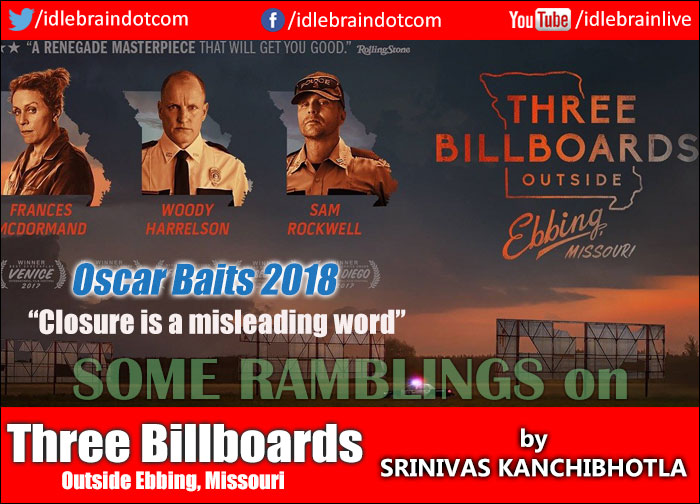
In the dying moments of "Memento" when the true psychological profile of the lead character is finally unveiled, he talks about creating a reality of his own, something he can believe in, something he HAS to believe in regardless of the facts and the truths that add up to that climactic moment, in order to deal with the horribble tragedy visited upon him, in order for himself to move on in life, in order to have a sense of purpose, or in simple terms, in order to have a reason to get out of the bed every morning and above all in order to not kill himself and end his life and end the tragedy once and for all. An alternate reality is a powerful psychological concept that the minds (need and) create to cope up with a shocking incident in one's life, be it telling themselves that the incident hasn't happened the way that "facts" purportedly add up to, or psych oneself into believing that it hadn't happened at all in the first place, or bury it deep within the cranial layers and do everything within one's power to suppress it for however long one can. This is pure survival mechanism, even if it comes at the cost of damaging all future relationships, forever eroding all confidence in oneself or everyone around, and lead a life of suspicion, fear and mistrust. The recent floodgates that have opened up on years of sexual misconduct in various spheres of work life in the United States, some stretching as far back as three or four decades, drowning and washing away the high and mighty from their precious seats of power, points to the simple fact that there is never a statute of limitations on closure. The wounds would continue to fester until the victim draws his pound of flesh from the perpetrator. It has become an all too common phenomenon in the recent few years following mass shootings at public places - schools, churches, work places et al - that the survivors and the families of the victims form a strong circle of the grieving fraternity, to make sense of the tragedy, to move on with their lives, and importantly, work at making sure that such events do not recur (howevermuch the odds are stacked against them). Mothers Against Drunk Driving (MADD), Guns Off Campus (GOC), and the numerous brotherhoods and fraternities supporting victims of sexual assault and of the families whose members haven't survived the attack to tell their tales, are all about grasping at the straws trying to find a place where they can land their guilt (yes, guilt), drown their sorrow or bury their misfortune. And at the nucleus of all these surviving tactics are undying rage and fuming anger, at themselves, at the society, at the situations that simply moved on leaving the victims to pick up the pieces in its wake. Consider this for a moment, what seated a pompous, inarticulate, arrogant and an ignorant person, who had no business being there in the first place, at the most powerful chair in the free world? No, not racism, misogyny, or even misanthrophy. It is anger, which, sometimes acts against its own self-interests. When a rape victim slashes her own wrists, or a laid off worker pulls the lever setting aside his own sense of decency and judgment in the voting booth, that's injustice crying hoarse at the top of its lungs screaming "HELP!!!".
"Three Billboards Outside Ebbing, Missouri" is about an undying fountain of simmering rage of a mother whose child has been raped and killed. The movie is not about the crime, nor is it about the investigation. It is about the aftermath, about how the family around copes with the tragedy in each of their ways, one with resignation, one by remaining stoic, and other with everlasting contempt for the world around. The recent tragedy of a mass shooting at an elementary school in Connecticut that has snubbed out 20 children (most of them between the ages of 5 and 6) at the hands of a mad kid brought together huge waves of support and sympathy from one side and suspicion and fear (of the government enacting serious gun control laws) from another, together colliding into a deluge of sorrow, fury, rage and anger, unable to come to terms, first, with the tragedy itself, and second, the resistance to such common sense laws that would help such mindless massacres never recur in public walks of life. The many foundations and trusts and campaigns, that came out out that tragic event all with the goals of honoring the memories of the fallen beloved and screaming at the world, while at it, to fix a broken system that has long been the scourge of the American society, are all expressions of anger, some sane and rational, and others, anything but, but all, nonetheless, equally valid. Afterall, what can be a measured response of a parent whose kid had met an untimely fate in the most appalling of manner? Frances McDormand, as the grieving mother, never lets up in her intensity and rage, misplacing and misdirecting them at the wrong people for all the wrong reasons; but when the wheels of justice turn ever so slowly in bringing the perpetrator to book, all's indeed fair in love and war. "Three Billboards" is a comedy about death, a tragedy about life, a vengeful story about retribution, and a desparate plea for justice.
checkout http://kanchib.blogspot.com for Srinivas's Blog.
